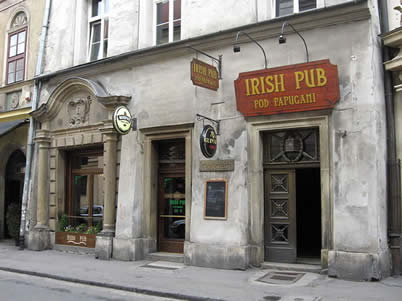Denis Gill
Dublin, Ireland

Big Hugh and I met while watching the Manchester United v. City game at a small pub near Brian Friel’s Ballybeg one evening… I slowly savoured a pint of Guinness while he downed a Smithwicks beer followed by a small chaser of Jameson whiskey. During desultory moments of the match we exchanged words about the weather, fish catches, and road accidents in Inishowen — non-committal conversation between men who were strangers.
Big Hugh told me that he was retired and living on his own. The local pub was his place for a pint, an occasional fag, and local sociability. Now in his eighties he enjoyed good health and a great deal of local respect. During the evening Big Hugh learned, through a question asked of me, that I was a doctor.
The United and City match was full of enthusiasm and physical commitment, but distinctly lacking in skills or attempts at goal. At the half time dissection, Big Hugh asked, “You’re a doctor?” “Yes indeed,” I replied in an off duty, deflectory manner. Big Hugh ordered a second Smithwicks, and I a second pint.
Snippets of conversation followed on United’s takeover, Roy Keane’s management abilities, Alex Ferguson’s demeanour and temper, the dominance of money in the game, and the lack of local talent. Some time later Big Hugh said “May I ask you a question”? “Certainly,” I said, mellowed by the second pint. “Tell me this,” he said “I’m eighty years, and I’ve never shaved.” “Lucky you,” I retorted, thinking, at the same time, that this is outside my area of expertise. The daily shave is one of those masculine chores I neglect while in Ballybeg, letting the greying stubble languish. It’s part of my rural relaxation: No ties. No shaves. No mobile phone. No e-mails. No cares.
“Let me think about it,” I suggested to Big Hugh, who, at this point, rose to his somewhat arthritic six-foot-something to go to the lavatory, followed by a quick puff out in the cold, lamenting Martin’s anti-smoking law, the curse of the small comforting pub. “Whatever happened to choice?” he asked, informing me that the landlord had favoured a designated smoking area. “Were I younger, I’d move across the border to Derry or Maghera or Dungiven.”
I retired to the back of the pub, to the landlord’s sitting room. We had become friendly acquaintances on return trips to Donegal. Several hours later near drinking up time, the landlord asked me if I would mind driving Big Hugh, who was a little full, home to his cottage. “No problem,” I helped Hugh, pleasantly inebriated, but by no means incapable, into the car and headed along the upper road.
The cottage on a narrow lane had a spectacular view across the lough, a moon-drenched sea with twinkling lights on the far shore. On the way Hugh told me that, as a bachelor, he liked living on his own, but much enjoyed the company and conviviality of the pub. I helped him to the door, turned the key, led him in, switched on the lights, and turned to bid him goodnight.
Then it struck me. The cottage was impeccable, a gleaming, spotless kitchen window giving panoramic view of the lough; doors neatly painted, flagstones swept clean, sink empty. The extra X was working. That had to be it. Consult the textbook on the morrow. “Good night,” he bid me as I reversed into the night mulling a little amusedly. Klinefelter. That’s it. Almost certainly.
Klinefelter. Tall, slim, and long limbed. Infrequent need to shave. First described by Klinefelter in 1942. Occurs in approximately 1 in 500-1000 males; so says the medical dictionary. Google, of course, produced an offputting but amazing 621,000 references 0.34 seconds later. Dictionaries are dinosaurs.
Affected males often go through life undiagnosed. Adult height taller than average. An extra X chromosome is the fundamental problem. The extra X certainly would explain the pristine cottage. And perhaps the bachelorhood. However, being a bachelor is a common phenomenon of men of Big Hugh’s age in rural Ireland. But in my experience, most single men’s cottages are rough and untidy.
On a later visit to Ballybeg I sadly learnt that Big Hugh had passed on. Hugh, I am told, was a gentle man, a self-content man, a much-liked man. He was long legged and a good sportsman in his day. A great catcher of a high ball.
In later life he was afflicted with diabetes mellitus resulting in the loss of parts of his sporting feet. By Inishowen standards he had been a big man, both in terms of stature and social esteem.
Hugh was born about 1920, some 20 years before Klinefelter described the XXY phenotype. It is suspected, I am told from a twenty-first century paper that as many as three quarters of men with Klinefelter’s syndrome remain undiagnosed and so untreated. Men of Hugh’s generation were unlikely to have asked to have their “private parts” inspected.
Hugh enjoyed a good, long, happy, mostly healthy life. He got me thinking about bachelorhood, the pub as a vital rural resource, and the compelling case for tolerating cigarette smoking in certain circumstances and places.
Hugh’s cottage, with its incredible invigorating views, was his pride and joy.
Big Hugh, you are what you were. A big likeable man.
DR. DENIS GILL is a retired Professor of Pediatrics at the Royal College of Surgeons in Ireland Dublin, author of “Paediatric Clinical Examination” (5th ed. ), former President of Confederation of European Specialists in Pediatrics. Denis Gill resides in Dublin, Ireland.
Highlighted in Frontispiece Winter 2010 – Volume 2, Issue 1

Leave a Reply